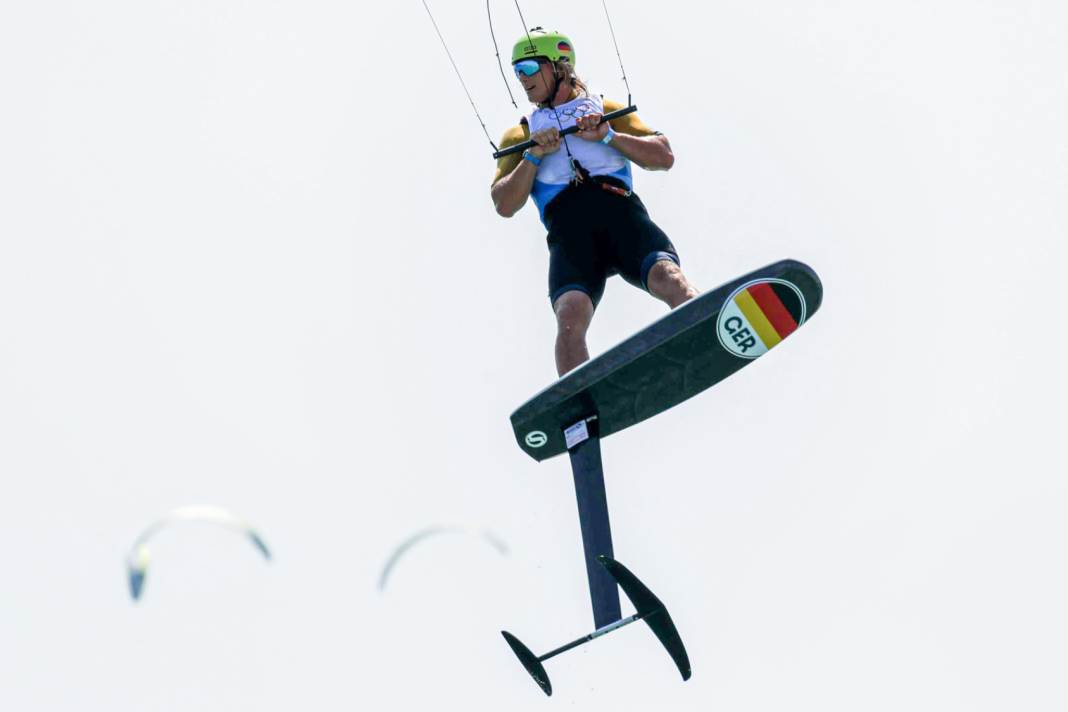Olympics: Kiters Meyer and Maus with best Olympic record - Team Germany without medals
Tatjana Pokorny
· 08.08.2024






One thing is certain after twelve days of the Olympic sailing regatta: wind forecasts for the Bay of Marseille are not certain! Even on the planned final day of the series of ten Olympic sailing disciplines, little went as the meteorologists had predicted. Instead, the Nacra 17 finalists once again had to push their way through the glittering waters with two hulls. The kiters had to wait before taking advantage of a good wind window in the afternoon for their semi-finals and the women's final. There was not enough pressure for the men's final. It will now take place on the reserve day: Toni Vodisek, Max Maeder, Ricardo Pianos and Valentin Bontus will line up for the furious Friday.
470 mixed gold goes to Austria
It was a cross with the wind right to the end of this Olympic regatta. However, the Austrians Lara Vadlau and Lukas Mähr were not fazed by this. They had started the first medal race of the day as front runners and were initially at the back of the fleet in tenth place in the 470 Mixed after match racing scenes with Spanish chasers Jordi Xammar and Nora Brugman. They worked their way up, then fell back again. Wherever you looked, there was an exciting battle.
The medal distribution changed constantly as the race progressed. In the end, seventh place in the medal race was enough for Vadlau/Mähr to win gold after a highly focussed preliminary performance in the main round. Lara Vadlau's nut-brown eyes shone in her straight face as she said: "We're Olympic champions, that sounds damn good. I already told Luki that out on the water. We believed that we could win a medal if we sailed well. But gold, that's brilliant!"
470 mixed silver went to Japan's Keju Okada and Miho Yoshioka. The Swedes Anton Dahlberg and Lovisa Karlosson were as happy with bronze as they were with gold. The Spaniards Jordi Xammar and Nora Brugman were the ones to suffer in the thrilling final. The reigning 470 world champions from Real Club Náutico de Barcelona wanted to fight for Olympic victory in Marseille and had to end the regatta without a medal after finishing ninth in the medal race.
Tita/Banti Olympic champions for the second time
In the second medal race of the day, the biggest pre-Olympic favourites once again finished strongly in second place. After five race wins and - apart from one early start - exclusively top five results, Italy's America's Cup helmsman Ruggero Tita and his foresailor Caterina Banti celebrated their second Olympic victory in a row. Technically outstanding and prepared to the limits of what is permitted and strong on the course in all conditions, the Azzurri once again demonstrated their superiority. Silver went to the successors of Rio Olympic star Santi Lange: Mateo Majdalani and Eugenia Bosco finished seventh in the medal final to take the second-highest place on the podium.
Bronze went to the jubilant Kiwis Micah Wilkinson and Erica Dawson. The final ended in tragedy for the likeable British medallists John Gimson and Ana Burnet. Shortly before their wedding, the Nacra sailors, who had entered the final in third place with a chance of silver and bronze, made a very close early start, which they had not identified as such. As a result, they did not rectify themselves, were disqualified and ended their previously successful week in fourth place.
"We try not to judge ourselves by results. I'm incredibly proud of how we sailed this week," said helmsman Gimson, finding comforting words after the low blow. Paul Kohlhoff and Alica Stuhlemmer (Kieler Yacht-Club) finished fifth in the "light" catamaran final. The Olympic bronze medallists from Enoshima remained in eighth place in the overall standings.
Kite gala for athletes and fans
Helmsman Paul Kohlhoff gave a brief summary on day twelve of the Olympic regatta: "The team, the organisation and everyone around them have done an extremely good job on the way here. They don't have much to criticise. We as the Nacra team simply didn't expect as little wind as we had during this Olympic week. This has hit our Achilles heel, which was already reduced in size but is a well-known Achilles heel."
Paul Kohlhoff and his foresailor Alica Stuhlemmer were among the DSV medal hopefuls before their third and second joint Olympic outing. However, the Kiel catamaran aces were unable to repeat their bronze performance from three years ago in Japan in Marseille's extreme conditions.
After the double-handed dinghies and the catamarans, the stage in Marseille belonged to the new Olympic kiters. The men and women alternated between their semi-finals and finals. The men did not make it to the final because the wind broke again. The semi-finals of the two groups of men and women showed what thousands of fans on the pier of the Olympic harbour of Marseille, in the beach arena and on the beaches had been looking forward to: thrilling action, catch-up races, battles for position and excitement right to the finish.
Reunion with Maus and Meyer in L. A.?
In his semi-final, Jannis Maus was up against Austrian Valentin Bontus, Brit Connor Bainbridge and American Markus Edegran. He was able to keep two of them at bay after a successful start, but Valentin Bontus won his heat and went through to the final. After a brief disappointment at missing out on a place in the final, Jannis Maus was very conciliatory after finishing fifth in his Olympic debut, saying: "I finished in the top five at the World Championships. If it had been more, that would have been absolutely fantastic. Of course, a medal would have been fantastic, but I can still be very satisfied. I achieved the goal I set myself."
Looking back on the severely shortened series, in which only 7 of 16 planned races could be held in the main round due to persistently difficult light wind conditions for the men, the dynamic rider from the Cuxkiters said: "I could perhaps have taken a little more risk in the very shortened regatta, but that's just a bit of a backslapping mistake, easily realised in hindsight."
Jannis Maus is keeping his fingers crossed for one rider in the kite final on Friday: "I think Max Maeder definitely deserves it. He rode so solidly. He's such a great sportsman. I hope he makes it." Jannis Maus is keen to continue his own kitesurfing career: "It's a great achievement that we kiters were able to deliver the best German result with two fifth places. I will definitely continue with the sport. It's far too much fun for me to say: one game and that's it."
Leonie Meyer fights to the finish
After Jannis Maus, Leonie Meyer was challenged in her semi-final, in which her opponents initially made it more difficult for her than she would have liked. The fact that she finished fifth and contributed just as much to the strong German kite performance as Jannis Maus was mainly down to her fighting spirit and good speed.
Leonie Meyer was eliminated after a dramatic semi-final run, a magnificent chase to catch up and a thrilling finish with Annelous Lammerts from the Netherlands. But she was beaten for less. Meyer's protest against an infringement of the Dutch winner's right of way was not upheld.
Meyer reported after the semi-final: "In my opinion, she definitely broke a rule. I protested directly. Then they sent us in. Then the tears came. Then they sent us out again because they said here on the beach that the Dutchwoman had been disqualified and it was just my race win. So we all went back out to wait there for a long time and then learnt that they hadn't disqualified her."
Light and shade in a team
Leonie Meyer has had an impressive week at the Olympics and probably doesn't want to leave it at that. The 31-year-old said after the semi-final with her son Levi on her shoulders: "It was a huge sacrifice as a mum. But of course it's worth it. Now I'd like to do it again and come home with a medal. I've definitely shown this week that the potential is there." Britain's Ellie Aldridge is the first female Olympic kite champion, beating France's kite star Lauriane Nolot and the Netherlands' Annelous Lammerts into second and third place. Exceptional kiteboarder Daniela Moroz remained without a medal in fourth place.
With two fifth places in kiteboarding, two sixth places for the young skiff sailors Marla Bergmann and Hanna Wille and the 22-year-old windsurfer Theresa Steinlein and eighth place for Kohlhoff/Stuhlemmer, five of the ten DSV teams made it into the top ten. Top performers such as windsurfing world and vice world champion Sebastian Kördel (12th), 2020 Ilca 7 world champion Philipp Buhl (13th) and the 470 mixed vice European champions Simon Diesch and Anna Markfort (14th) missed their medal targets, but took themselves to task after the extreme light wind series.
Of course, the result is very, very bitter. We simply had medal candidates who perhaps didn't get into the regatta so well. Very, very bitter of course for Buhli and Basti, who didn't make it into the medal races even though they deserved to" (Jannis Maus)
This is the first Olympic sailing regatta without medals for the national sailing team since 2012. Most recently, the DSV sailors won one silver and two bronze medals in Enoshima, Japan. DSV Sports Director Nadine Stegenwalner said: "It's a bit early to analyse the situation in detail while the competition is still ongoing, but it will be intensive, open and honest."
Analysis ahead, L.A. already in sight
Nadine Stegenwalner said on behalf of the entire team: "Of course we are disappointed, because we are all passionate about this team. But we have also achieved some good results, especially with the younger teams, which gives us confidence for 2028. Unfortunately, others have fallen short of their expectations and have not been able to fulfil their potential. The weather conditions here were special, but of course the same for everyone. However, they were easier than we have had in many training sessions here. The format has also been shortened and the reserve days have been cancelled - that was also new."
Nadine Stegenwalner continued in Marseille: "We will analyse things thoroughly, but one thing is also clear: the next Olympic venue in Los Angeles in 2028 will be completely different again. The conditions will be different, it's a different time zone. The training opportunities overseas will be different, just in terms of travelling. So no matter how well you've done, you always have to check: What can you learn from this cycle? What went well and what needs to be adapted? And that will have to be done clearly and honestly and, to a certain extent, ruthlessly."

Tatjana Pokorny
Sports reporter

